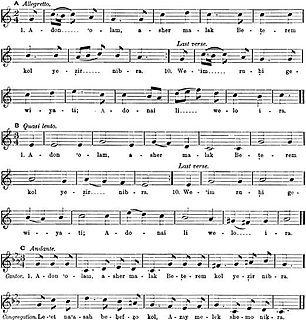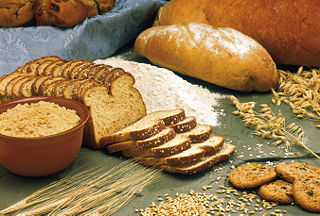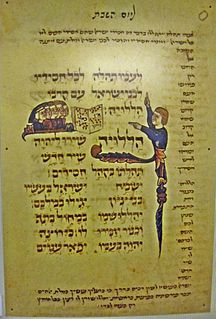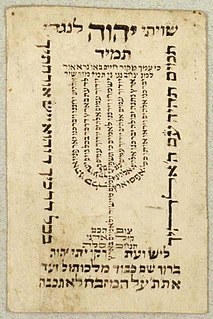 W
WAdon Olam is hymn in the Jewish liturgy. It has been a regular part of the daily and Shabbat (Sabbath) liturgy since the 15th century.
 W
WThe Amidah, also called the Shemoneh Esreh, is the central prayer of the Jewish liturgy. This prayer, among others, is found in the siddur, the traditional Jewish prayer book. Due to its importance, it is simply called hatefila in rabbinic literature.
 W
WAsher yatzar is a blessing in Judaism. It is recited after engaging in an act of excretion or urination, but is also included in many Jewish prayer books as a part of daily prayer prior to birkot hashachar.
 W
WBirkat HaBayit is a Jewish prayer often inscribed on wall plaques or hamsas and featured at the entrance of some Jewish homes. There are various versions of the prayer.
 W
WBirkat Hachama refers to a rare Jewish blessing that is recited to the Creator, thanking Him for creating the sun. The blessing is recited when the sun completes its cycle every 28 years on a Tuesday at sundown. Jewish tradition says that when the Sun completes this cycle, it has returned to its position when the world was created. Because the blessing needs to be said when the sun is visible, the blessing is postponed to the following day, on Wednesday morning.
 W
WBirkat Hamazon, known in English as the Grace After Meals, is a set of Hebrew blessings that Jewish Halakha prescribes following a meal that includes at least a kezayit piece of bread. It is a mitzvah de'oraita, that is written in the Torah.
 W
WDayenu is a song that is part of the Jewish holiday of Passover. The word "dayenu" means approximately "it would have been enough", "it would have been sufficient", or "it would have sufficed". This traditional up-beat Passover song is over one thousand years old. The earliest full text of the song occurs in the first medieval haggadah, which is part of the ninth-century Seder Rav Amram. The song is about being grateful to God for all of the gifts he gave the Jewish people, such as taking them out of slavery, giving them the Torah and Shabbat, and had God only given one of the gifts, it would have still been enough. This is to show much greater appreciation for all of them as a whole. The song appears in the haggadah after the telling of the story of the exodus and just before the explanation of Passover, matzah, and the maror.
 W
WDevekut, debekuth, deveikuth or deveikus is a Jewish concept referring to closeness to God. It may refer to a deep, trance-like meditative state attained during Jewish prayer, Torah study, or when performing the 613 mitzvot. It is particularly associated with the Jewish mystical tradition.
 W
WThe haftarah or haftorah, is a series of selections from the books of Nevi'im ("Prophets") of the Hebrew Bible (Tanakh) that is publicly read in synagogue as part of Jewish religious practice. The Haftarah reading follows the Torah reading on each Sabbath and on Jewish festivals and fast days. Typically, the haftarah is thematically linked to the parasha that precedes it. The haftarah is sung in a chant. Related blessings precede and follow the haftarah reading.
 W
WHallelujah is an interjection. It is a transliteration of the Hebrew phrase הַלְלוּ יָהּ, which is composed of two elements: הַלְלוּ and יָהּ . The term is used 24 times in the Hebrew Bible, twice in deuterocanonical books, and four times in the Christian Book of Revelation.
 W
WHavdalah is a Jewish religious ceremony that marks the symbolic end of Shabbat and ushers in the new week. The ritual involves lighting a special havdalah candle with several wicks, blessing a cup of wine and smelling sweet spices. Shabbat ends on Saturday night after the appearance of three stars in the sky. Some communities delay the Havdalah in order to prolong Shabbat.
 W
WKiddush Levanah is a Jewish ritual, performed outside at night, in which a series of prayers are recited to bless the new moon.
 W
WMa Nishtana, are the first two words in a phrase meaning "Why is tonight different from all other nights?" The phrase appears at the beginning of each line of The Four Questions, traditionally asked via song by the youngest capable child attending Passover Seder.
 W
WMatzo, matzah, or matza is an unleavened flatbread that is part of Jewish cuisine and forms an integral element of the Passover festival, during which chametz is forbidden.
 W
WMizrah is the Hebrew word for "east" and the direction that Jews in the Diaspora west of Israel face during prayer. Practically speaking, Jews would face the city of Jerusalem when praying, and those north, east, or south of Jerusalem face south, west, and north respectively.
 W
WSelichot or slichot are Jewish penitential poems and prayers, especially those said in the period leading up to the High Holidays, and on fast days. The Thirteen Attributes of Mercy are a central theme throughout these prayers.
 W
WShema Yisrael is a Jewish prayer, and is also the first two words of a section of the Torah, and is the title of a prayer that serves as a centerpiece of the morning and evening Jewish prayer services. The first verse encapsulates the monotheistic essence of Judaism: "Hear, O Israel: the LORD our God, the LORD is one", found in Deuteronomy 6:4.
 W
WShiviti are meditative representations of a candlestick used in some Jewish communities for contemplation over God's name. They are usually placed over the amud - the podium from which the prayer service is led by the hazzan. A decorated parochet or mizrach tapestry, or a special illustrated page in the siddur with similar imagery may also serve the same function.
 W
WSong of Ascents is a title given to fifteen of the Psalms, 120–134, each starting with the superscription Shir Hama'aloth, or, in the case of Psalm 121, Shir Lama'aloth. They are also variously called Gradual Psalms, Songs of Degrees, Songs of Steps, songs for going up to worship or Pilgrim Songs.
 W
WThe Song of the Sea is a poem that appears in the Book of Exodus of the Hebrew Bible, at Exodus 15:1–18. It is followed in verses 20 and 21 by a much shorter song sung by Miriam and the other women. The Song of the Sea was reputedly sung by the Israelites after their crossing the Red Sea in safety, and celebrates the destruction of the Egyptian army during the crossing, and looks forward to the future conquest of Canaan.
 W
WTefilat HaDerech or the Traveler's Prayer or Wayfarer's Prayer in English, is a prayer for a safe journey recited by Jews, when they travel, by air, sea, and even on long car trips. It is recited at the onset of every journey, and preferably done standing but this is not necessary. It is often inscribed onto hamsas which sometimes contain the Sh'ma or Birkat HaBayit prayer instead.